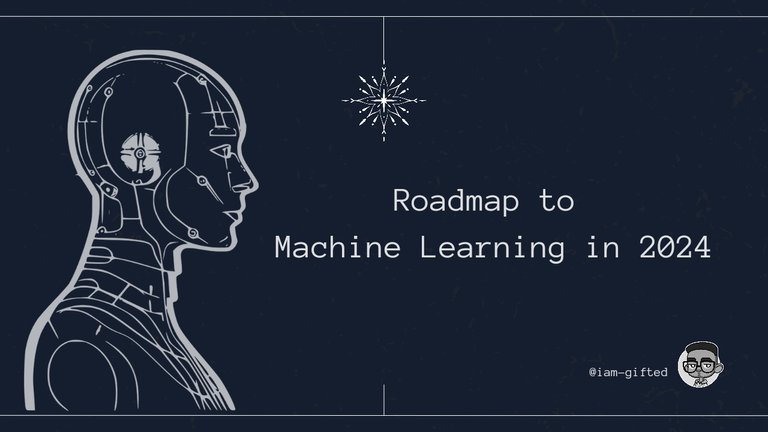Roadmap to Machine Learning in 2024

We are in the technological evolution of AI, where in almost every applications and industry we can find AI incorporated. This shows the relevance to why A.I. is a good career path, making it relevant in society. So in the texts below, I will be highlighting how you can learn A.I. in the space of 8 months to 12 months
1. Select a Programming language of your choice, either Python or R
The first thing you need to do before starting anything is to pick a programming language and personally, I will recommend Python because it is popular and also has a very vast community as compared to R.
After selecting python as a programming language, there are a series of topics that are important for you to cover and they are:
- Basic Syntax in python programming: Variable, data types, operators, control structures, and functions
- Data structures: Lists, tuples, dictionaries and sets
- Python Libraries for AI: Numpy for numerical computing, Pandas for data manipulation and analysis, Matplotlib, and Seaborn for data visualisation.
2. Data Manipulation and Analysis
This is the stage where you will be introduced to how to collect, clean, and prepare data for machine learning models. It involves the use of Pandas for data filtering, sorting, wangling, and merging. It also involves Data visualisation with the use of matplotlib and seaborn to provide insights on data.
3. Learn Python Functions and Object-Oriented Programming
Python functions help us create reusable blocks of code, which promotes modularity and simplifies complex tasks. Thereafter, you will move on to learning OOP, also known as object-oriented programming, which helps to structure larger programs and manage complexity.
4. Data Structures and Algorithms (DSA)
With knowledge of data structures and algorithms, you will learn to write cleaner, more efficient and more scalable code. This knowledge will be of great help in learning how to tackle complex problems in various fields and write codes that run faster, use less memory and are more efficient.
5. Mathematics Foundations
At this stage, it will be a great time to brush through your mathematical foundations, which is crucial for many AI algorithms. It is important to learn the following:
- Linear Algebra
- Calculus
- Probability and Statistics
6. Diving into AI (ML Foundations)
Learn the basic concepts of AI, understand what machine learning is, and learn about the different approaches to machine learning: supervised learning, unsupervised learning, and reinforcement learning.
7. Deepen your knowledge in ML
Explore machine learning algorithms like linear regression, decision trees, and random forests, and support vector machines. You should get an introduction to CNN, Convolution Neural Network and RNN, Recurrent Neural Network.
8. Choose area of Specification
After gaining a good foundation in AI, you need to choose an area of specification so as you can stand out in the industry. Having a central focus will make you unique and make you known as the 'guy' for this type of job. So here are some areas of specification available in the field of AI.
- Computer Vision: This is about enabling machines or computers to interpret and understand visual data from their surroundings. In this path, you will learn about image processing, object detection, segmentation, and generation.
- Natural Language Processing: This involves enabling computers to understand and interpret human language. It generally involves developing algorithms that can process, analyze, and generate texts and speech.
- Generative Adversarial Networks: This involves building models to be able to generate new synthetic data from already existing data.
9. Git and Github
Up next, it is important to learn git and github so that you can manage your code, track every change, and also collaborate with other developers.
10. Cloud Platforms
Learning about cloud platforms such as Amazon Web Services (AWS), Google Cloud Platform, and Microsoft Azure is necessary for your journey as an AI engineer. These platforms can be learned to:
- Deploy machine learning models.
- use pre-built AI services for Computer Vision and NLP.
- Manage data and storage processing.
- Scale AI applications.
11. Working on Projects and Collaborating
With your new set of skills, you are open to building projects and contributing to open source projects which makes GitHub a great place for that.
There is also kaggle which has a lot of learning resources and hands on project to work on.
👏 Keep Up the good work on Hive ♦️ 👏
❤️ @bhattg suggested sagarkothari88 to upvote your post ❤️
This might be tough but thanks so much!
I hope you get to consider the path.
Okay, you certainly got my attention. I think I am going to consider this path. I haven't coded anything in some years, but this post is stirring me to begin learning again.
What programming language do you know?
Visual Basic, and I haven't used it for close to 20 years now 😳 😅. Then, I used it with SQL Server for database development. And then, life happened...
How do I start learning Python from scratch?
Here is where you can start learning from scratch:
https://www.coursera.org/specializations/python?irgwc=1&utm_medium=partners&utm_source=impact&utm_campaign=4032620&utm_content=b2c&irclickid=UY63bRXvZxyIT8F2vITtFy6IUkHQbbUtv1oOw40
Awesome! Thank you so much!